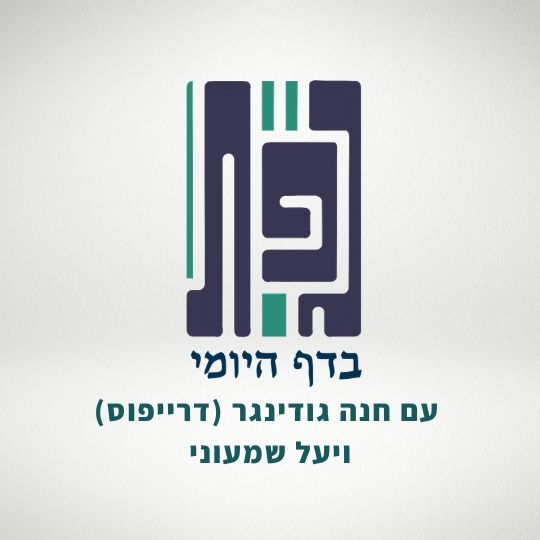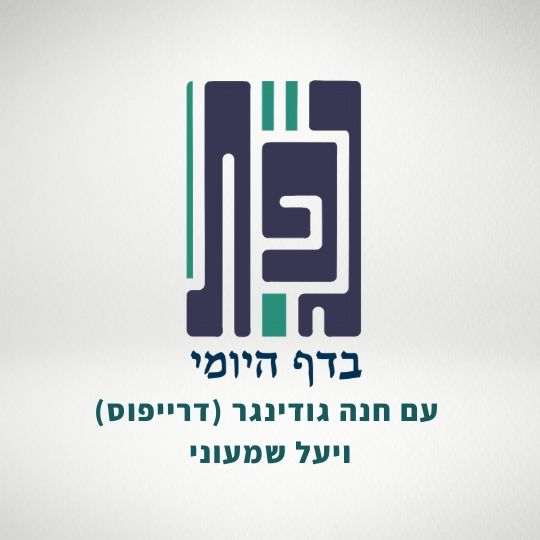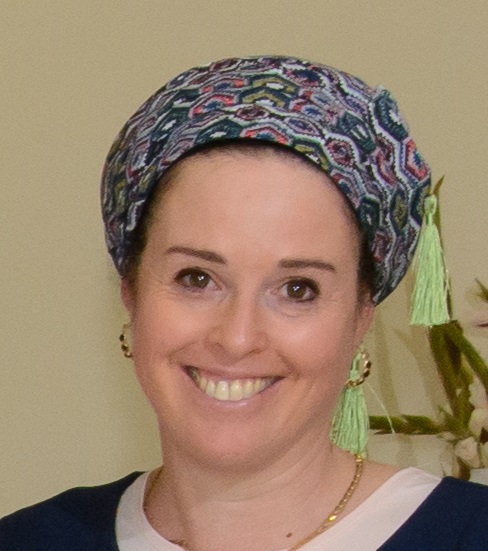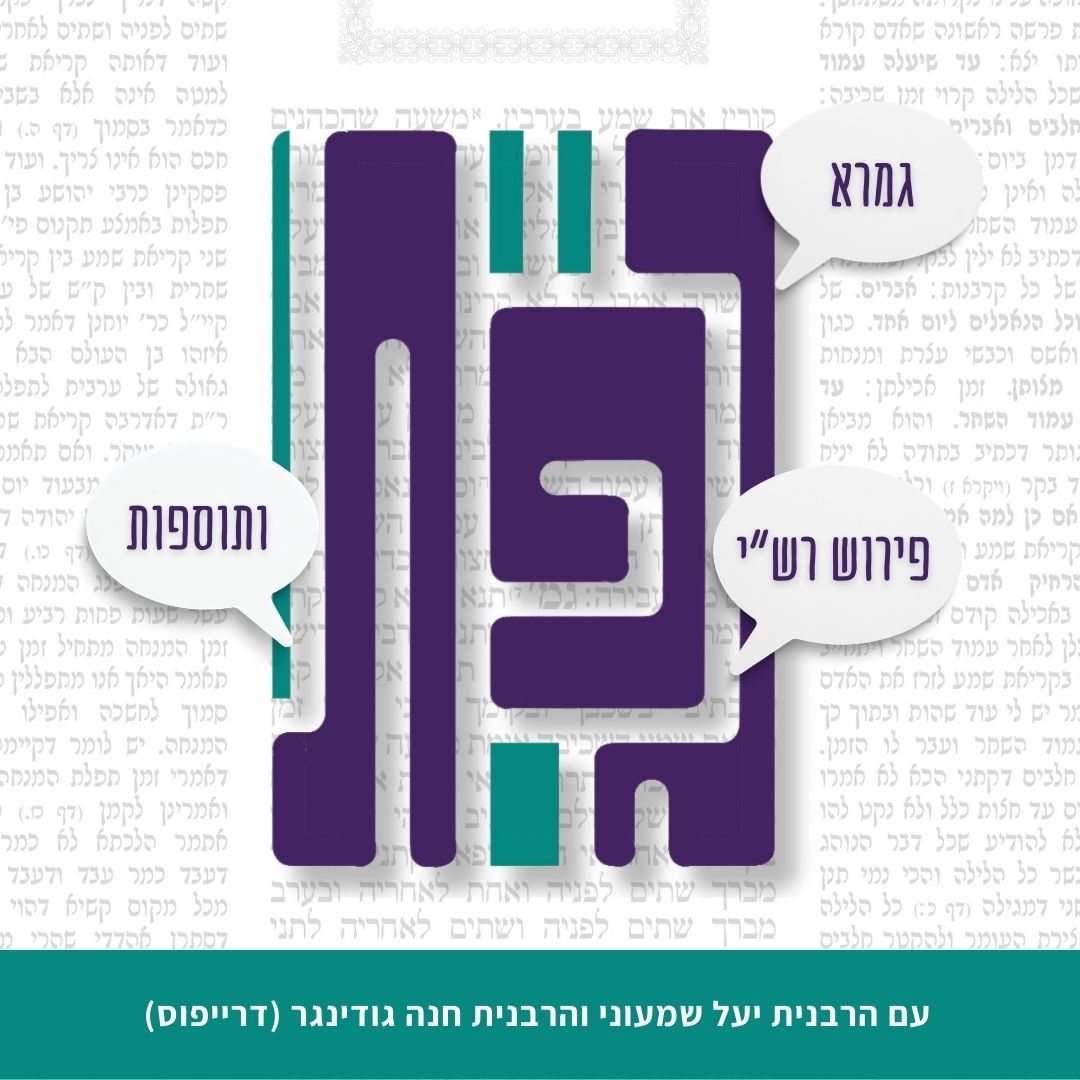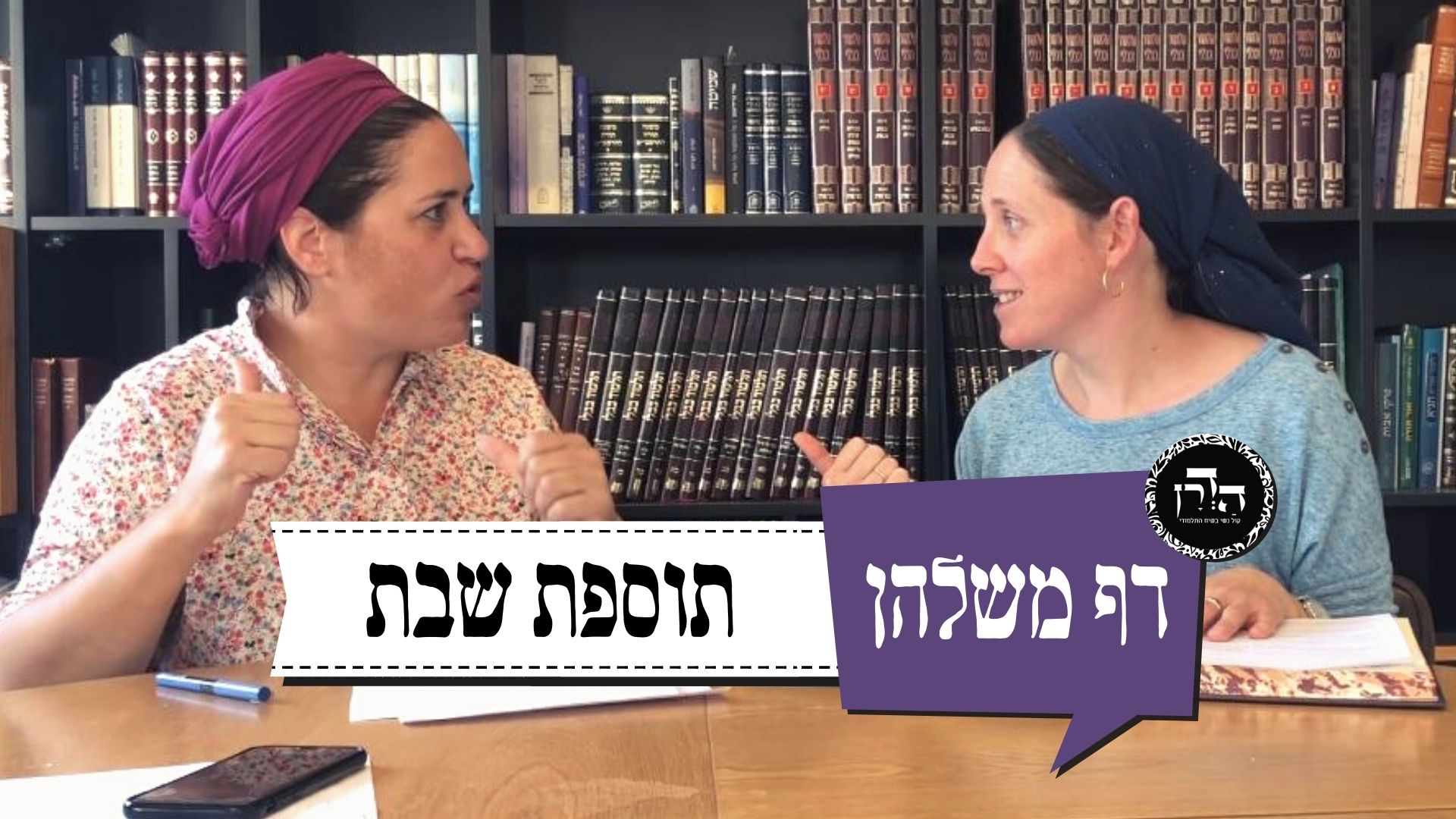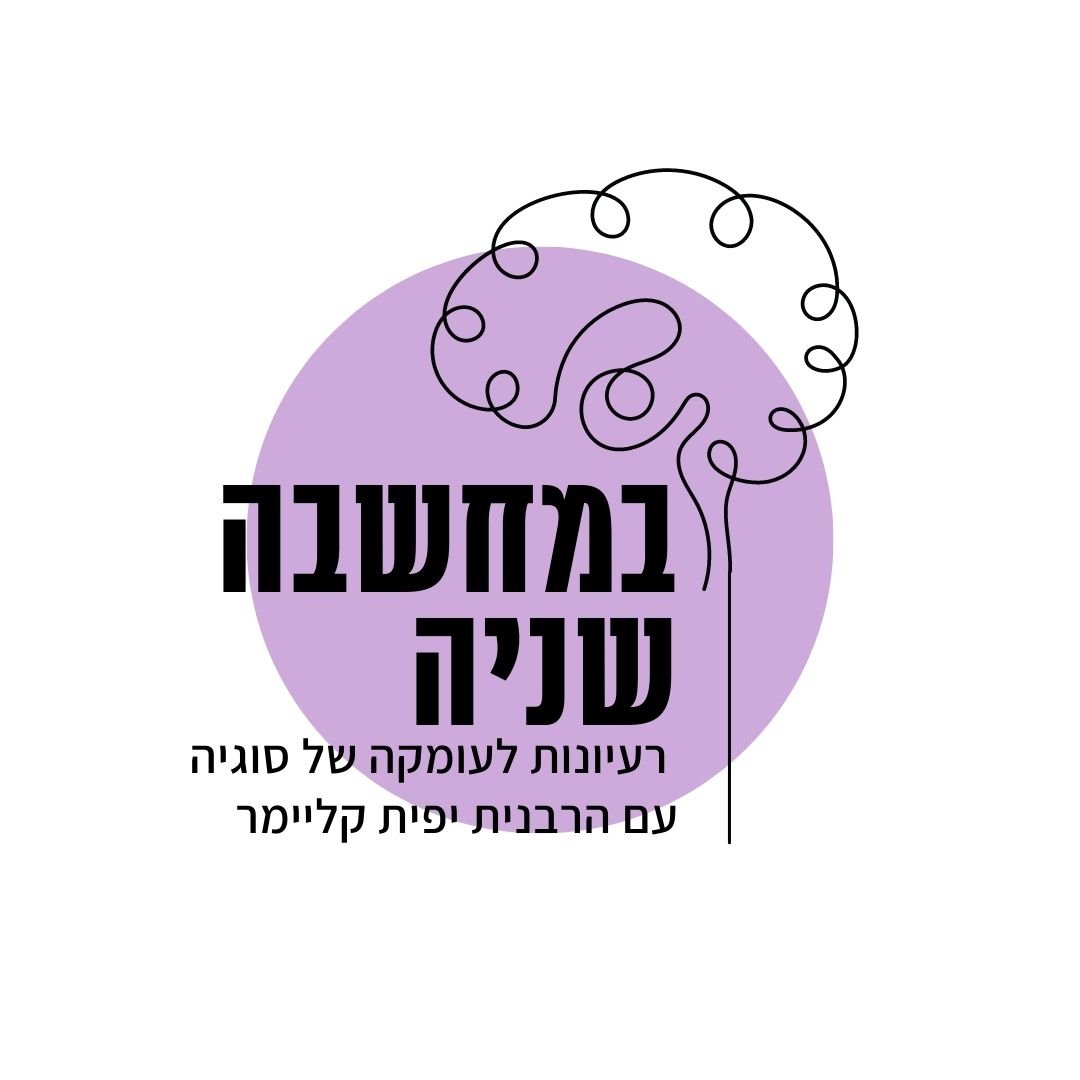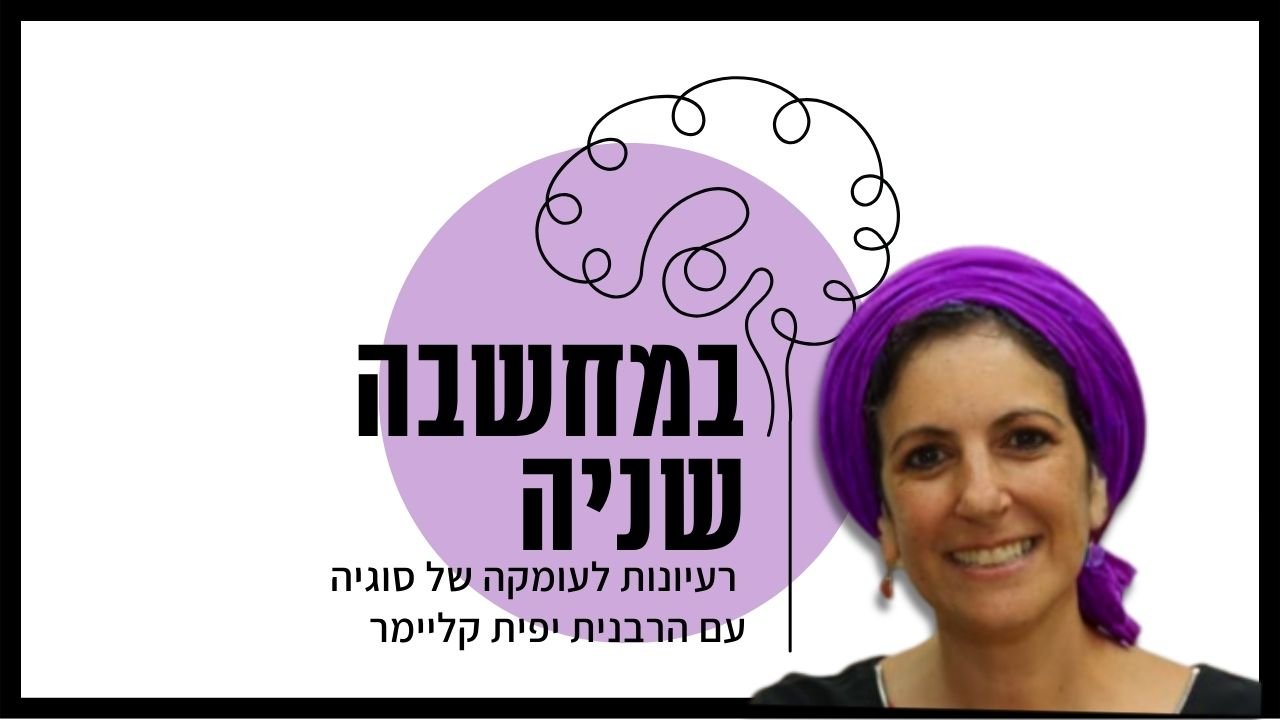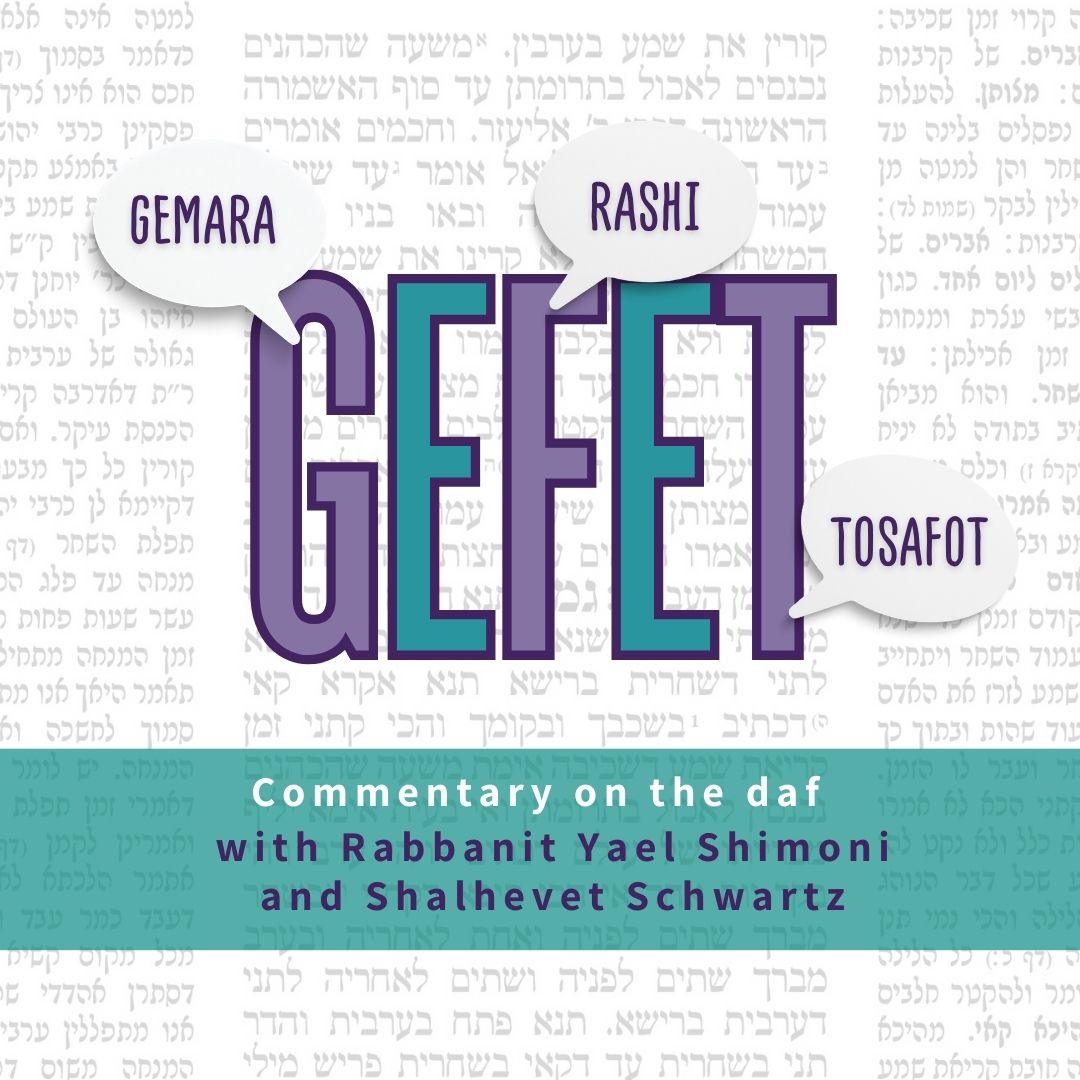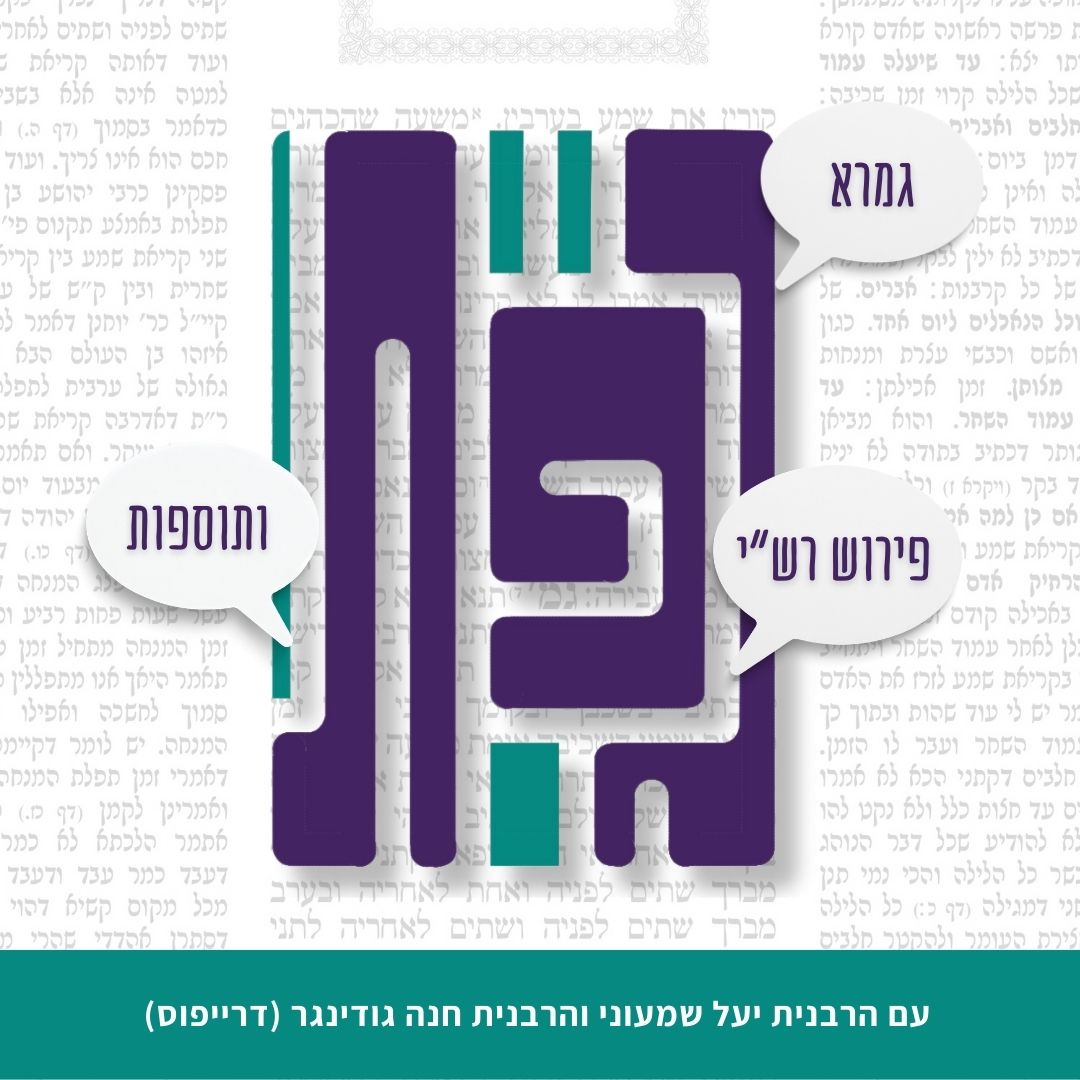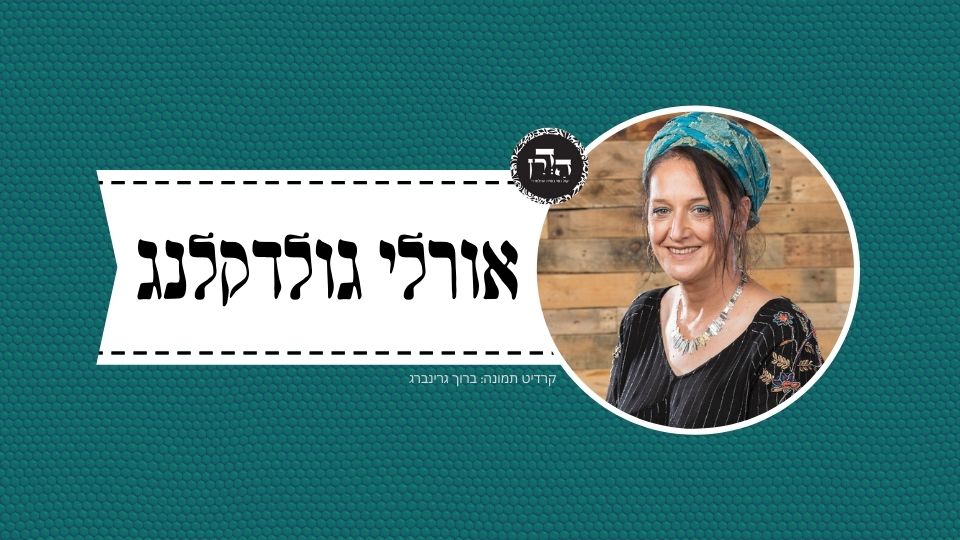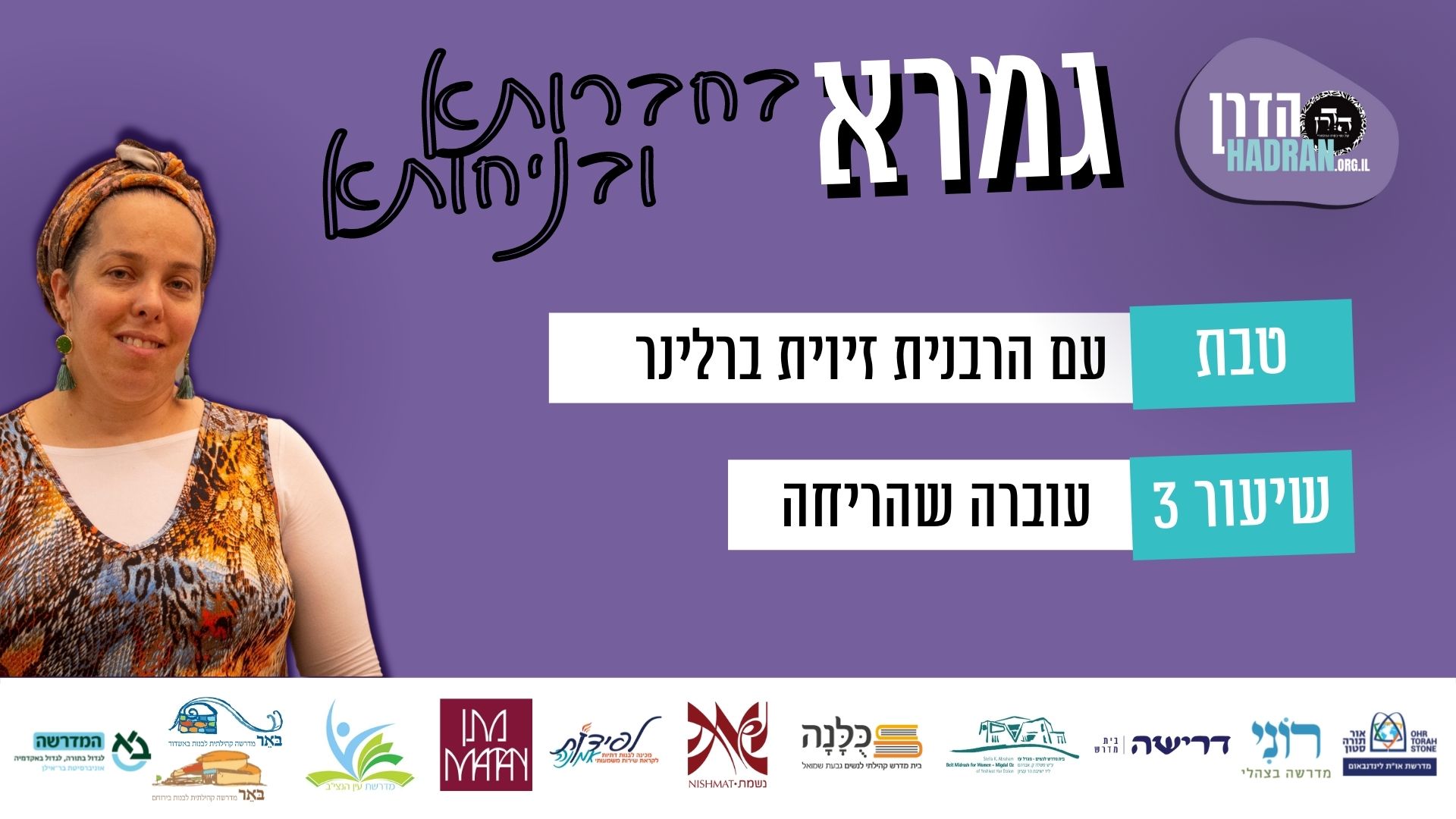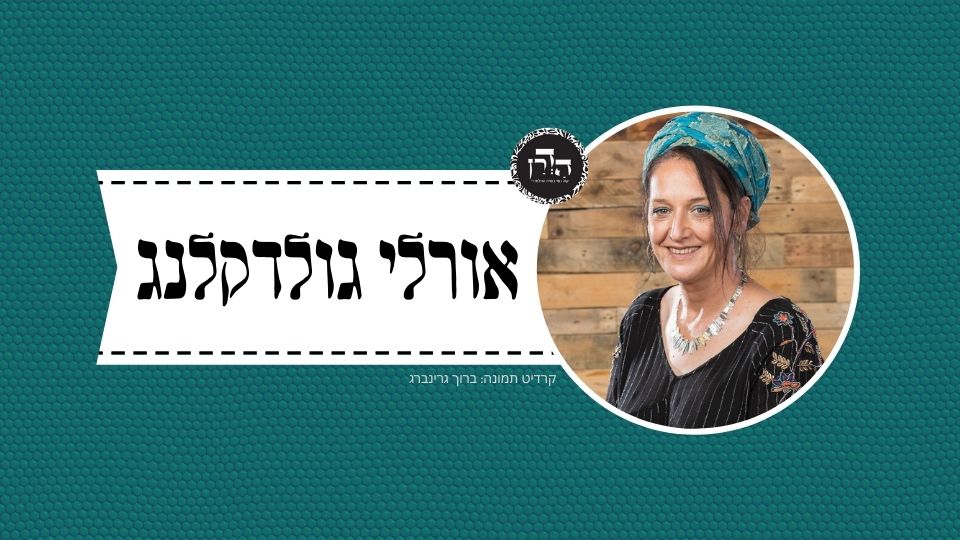מהן ההבדלים בין מי שנודר ערך של מישהו לבין מי שאומר "ערך פלוני עלי”?באיזה עניינים הם דומים? מי כלול בתוך הנודר, המעריך, הנידר, המוערך ומי לא? הגמרא עושה סקירה בכל המקומות במשנה שכתוב המילה "הכל” ומסביר איזה מקרה בא המילה הזאת לכלול בכל מקום.

כלים
הלימוד החודש מוקדש לרפואת פיליס הכט, גיטל פעשא בת מאשה רחל על ידי חברותיה הרבות שאוהבות ומעריכות אותה.
כלים
העמקה
רוצה להבין מה באמת קורה מתחת לפני השטח של הסוגיה?
שיעורים, פודקאסטים והרחבות של מיטב המורות שלנו יפתחו לך עוד זוויות וכיווני חשיבה.
חדשה בלימוד הגמרא?
זה הדף הראשון שלך? איזו התרגשות עצומה! יש לנו בדיוק את התכנים והכלים שיעזרו לך לעשות את הצעדים הראשונים ללמידה בקצב וברמה שלך, כך תוכלי להרגיש בנוח גם בתוך הסוגיות המורכבות ומאתגרות.
פסיפס הלומדות שלנו
גלי את קהילת הלומדות שלנו, מגוון נשים, רקעים וסיפורים. כולן חלק מתנועה ומסע מרגש ועוצמתי.
ערכין ב
מַתְנִי׳ הַכֹּל מַעֲרִיכִין, וְנֶעֱרָכִין, נוֹדְרִין וְנִידָּרִין — כֹּהֲנִים, לֹוִים וְיִשְׂרְאֵלִים, נָשִׁים וַעֲבָדִים.
MISHNA: Everyone takes vows of valuation and is thereby obligated to donate to the Temple treasury the value fixed by the Torah (see Leviticus 27:3–7) for the age and sex of the person valuated. And similarly, everyone is valuated, and therefore one who vowed to donate his fixed value is obligated to pay. Likewise, everyone vows to donate to the Temple treasury the assessment of a person, based on his market value to be sold as a slave, and is thereby obligated to pay; and everyone is the object of a vow if others vowed to donate his assessment. This includes priests, Levites and Israelites, women, and Canaanite slaves.
טוּמְטוּם וְאַנְדְּרוֹגִינוֹס, נוֹדְרִין וְנִידָּרִין וּמַעֲרִיכִין, אֲבָל לֹא נֶעֱרָכִין, שֶׁאֵינוֹ נֶעֱרָךְ אֶלָּא הַזָּכָר וַדַּאי וּנְקֵבָה וַדָּאִית.
A tumtum, whose sexual organs are concealed, and a hermaphrodite [androginos], vow, and are the object of a vow, and take vows of valuation, but they are not valuated. Consequently, if one says, with regard to a tumtum: The valuation of so-and-so is incumbent upon me to donate to the Temple treasury, he is not obligated to pay anything, as only a definite male or a definite female are valuated.
חֵרֵשׁ שׁוֹטֶה וְקָטָן נִידָּרִין וְנֶעֱרָכִין, אֲבָל לֹא נוֹדְרִין וְלֹא מַעֲרִיכִין, מִפְּנֵי שֶׁאֵין בָּהֶם דַּעַת.
A deaf-mute, an imbecile, and a minor are the object of a vow and are valuated, but neither vow to donate the assessment of a person nor take a vow of valuation, because they lack the presumed mental competence to make a commitment.
גְּמָ׳ ״הַכֹּל מַעֲרִיכִין״ — לְאֵתוֹיֵי מַאי? לְאֵתוֹיֵי מוּפְלָא סָמוּךְ לְאִישׁ.
GEMARA: The Gemara asks: What is added by the mishna’s statement: Everyone [hakol] takes vows of valuation? When a principle is stated in a mishna, it serves to include a particular case that it does not mention explicitly in its halakha. Which case is included by the broad statement here? The Gemara answers: The mishna teaches it to add a discriminating minor on the brink of adulthood [mufla samukh le’ish], i.e., during the year before a minor reaches majority.
״נֶעֱרָכִין״ — לְאֵתוֹיֵי מַאי? לְאֵתוֹיֵי מְנוָּּול וּמוּכֵּה שְׁחִין.
The Gemara similarly asks: What is added by the statement: And everyone is valuated? The Gemara answers: The mishna serves to add a repulsive man and one afflicted with boils, who have no market value.
סָלְקָא דַּעְתָּךְ אָמֵינָא: ״נֶדֶר בְּעֶרְכְּךָ״ כְּתִיב, כֹּל שֶׁיֶּשְׁנוֹ בְּדָמִים — יֶשְׁנוֹ בַּעֲרָכִין, וְכֹל שֶׁאֵינוֹ בְּדָמִים — אֵינוֹ בַּעֲרָכִין.
The Gemara explains why this addition is necessary: It might enter your mind to say that as it is written in the verse: “A vow of persons to the Lord, according to your valuation” (Leviticus 27:2), which juxtaposes one who is valuated to one who is the object of a vow, anyone who is included in the category of assessments, i.e., if he vows to pay his assessment he must pay it to the Temple, is also included in the category of valuations. But anyone who is not included in the category of assessments is not included in the category of valuations. Since these people, a repulsive man and one afflicted with boils, are not subject to assessment, as they have no market value, perhaps they are also not subject to valuation.
קָא מַשְׁמַע לַן ״נְפָשֹׁת״, כָּל דְּהוּ.
Therefore, the mishna teaches us that these too are subject to valuation, as the same verse also states: “Persons [nefashot],” indicating anyone who has any amount of life [nefesh] is subject to valuation.
״נוֹדְרִין״ — לְאֵתוֹיֵי מַאי? נִידָּרִין אִיצְטְרִיךְ לֵיהּ.
The Gemara further asks: What is added by the mishna’s statement: Everyone vows to donate the assessment of a person? The Gemara answers: Actually, this statement is not necessary, but it is mentioned because the continuation: And everyone is the object of a vow, was necessary.
״נִידָּרִין״ — לְאֵתוֹיֵי מַאי? אִי לְאֵתוֹיֵי טוּמְטוּם וְאַנְדְּרוֹגִינוֹס — בְּהֶדְיָא קָתָנֵי לְהוּ! וְאִי לְאֵתוֹיֵי חֵרֵשׁ שׁוֹטֶה וְקָטָן — בְּהֶדְיָא קָתָנֵי לְהוּ!
The Gemara inquires: What, then, is added by the clause: And everyone is the object of a vow? If one were to suggest that this serves to add a tumtum and a hermaphrodite, that cannot be correct, as they are explicitly taught in the mishna itself. And if one were to suggest that it serves to add a deaf-mute, an imbecile, and a minor, they too are explicitly taught in the mishna.
אִי לְאֵתוֹיֵי פָּחוֹת מִבֶּן חוֹדֶשׁ, בְּהֶדְיָא קָתָנֵי לְהוּ! וְאִי לְאֵתוֹיֵי נָכְרִי, בְּהֶדְיָא קָתָנֵי לְהוּ! לְעוֹלָם לְאֵתוֹיֵי פָּחוֹת מִבֶּן חוֹדֶשׁ, וְתָנֵי וַהֲדַר מְפָרֵשׁ.
And if you say that this clause serves to add the halakha that a child who is less than a month old, who is not subject to valuation, is nevertheless subject to assessment, this too is explicitly taught in a mishna (5a). And if one were to say that it serves to add a gentile, that is also explicitly taught in a mishna (5b). The Gemara answers: Actually, the phrase: And everyone is the object of a vow, is mentioned in the mishna in order to add a child who is less than a month old, and the mishna teaches this halakha in general terms and then explains it in detail later.
״הַכֹּל סוֹמְכִין״ — לְאֵתוֹיֵי מַאי? לְאֵתוֹיֵי יוֹרֵשׁ, וּדְלָא כְּרַבִּי יְהוּדָה.
§ The Gemara inquires about similar general expressions that appear in other mishnayot. What is added by the mishna (Menaḥot 93a): Everyone who brings an offering places hands on the head of the animal? The Gemara answers: This clause serves to add that an heir places hands on the offering of the deceased, and the mishna is not in accordance with the opinion of Rabbi Yehuda that an heir does not place his hands on an offering he inherited.
״הַכֹּל מְמִירִין״ — לְאֵתוֹיֵי מַאי? לְאֵתוֹיֵי יוֹרֵשׁ, וּדְלָא כְּרַבִּי יְהוּדָה.
The Gemara asks: What is added by the ruling of the mishna (Temura 2a): Everyone substitutes a non-sacred animal for a consecrated animal? The Gemara answers: Here too, the mishna serves to add that an heir substitutes a non-sacred animal for his father’s consecrated animal, i.e., the non-sacred animal also becomes sanctified. And this mishna is also not in accordance with the opinion of Rabbi Yehuda, as he maintains that an heir cannot substitute a non-sacred animal for the consecrated animal he inherited.
דְּתַנְיָא: יוֹרֵשׁ סוֹמֵךְ, יוֹרֵשׁ מֵימֵר. רַבִּי יְהוּדָה אוֹמֵר: יוֹרֵשׁ אֵינוֹ סוֹמֵךְ, יוֹרֵשׁ אֵינוֹ מֵימֵר.
The Gemara cites the source for these two opinions of Rabbi Yehuda. As it is taught in a baraita: An heir places hands on his father’s offering, and an heir can effect substitution for an offering inherited from his father. Rabbi Yehuda says: An heir does not place hands and an heir cannot effect substitution.
מַאי טַעְמָא דְּרַבִּי יְהוּדָה? ״קׇרְבָּנוֹ״ וְלֹא קׇרְבַּן אָבִיו, וְיָלֵיף תְּחִלַּת הֶקְדֵּשׁ מִסּוֹף הֶקְדֵּשׁ — מָה סוֹף הֶקְדֵּשׁ יוֹרֵשׁ אֵינוֹ סוֹמֵךְ, אַף תְּחִלַּת הֶקְדֵּשׁ יוֹרֵשׁ אֵינוֹ מֵימֵר.
The Gemara asks: What is the reasoning of Rabbi Yehuda? With regard to placing of hands, he expounds the term: “His offering” (Leviticus 3:2), as teaching that one places his hands only on his own offering, but not on his father’s offering. And with regard to the ruling that an heir cannot effect substitution, Rabbi Yehuda derives the halakha of the initial stage of consecration, i.e., substitution, in which a previously non-sacred animal is consecrated, from the final stage of consecration, the act of placing hands, which is performed upon an already-consecrated animal immediately before it is slaughtered: Just as with regard to the final stage of consecration, an heir does not place hands, so too, with regard to the initial stage of consecration, an heir cannot effect substitution.
וְרַבָּנַן, הָמֵר יָמִיר — לְרַבּוֹת אֶת הַיּוֹרֵשׁ, וְיָלְפִינַן סוֹף הֶקְדֵּשׁ מִתְּחִלַּת הֶקְדֵּשׁ: מָה תְּחִלַּת הֶקְדֵּשׁ — יוֹרֵשׁ מֵימֵר, אַף סוֹף הֶקְדֵּשׁ — יוֹרֵשׁ סוֹמֵךְ.
And from where do the Rabbis derive their opinion? The verse states: “If he shall substitute [hamer yamir] animal for animal” (Leviticus 27:10), with the doubled form of hamer yamir serving to include the heir as one capable of effecting substitution. And the Rabbis derive the final stage of consecration, i.e., the placing of hands, from the initial stage of consecration, i.e., substitution: Just as with regard to the initial stage of consecration an heir can effect substitution, so too, with regard to the final stage of consecration, an heir can place hands.
וְרַבָּנַן, הַאי ״קׇרְבָּנוֹ״ מַאי עָבְדִי לֵיהּ? מִיבְּעֵי לֵיהּ: ״קׇרְבָּנוֹ״ — וְלֹא קׇרְבַּן גּוֹי, ״קׇרְבָּנוֹ״ — וְלֹא קׇרְבַּן חֲבֵירוֹ, ״קׇרְבָּנוֹ״ — לְרַבּוֹת כׇּל בַּעֲלֵי חוֹבְרִין לִסְמִיכָה.
The Gemara asks: And as for the Rabbis, what do they do with this term: “His offering,” from which Rabbi Yehuda derives that an heir does not place his hands? The Gemara explains how the Rabbis expound each mention of the term, which appears three times (Leviticus 3:2, 7, 12). One instance of “his offering” teaches that one places hands only on one’s own offering, but not on the offering of a gentile. Another instance of “his offering” teaches that one places hands only on one’s own offering, but not on the offering of another person. The third instance of “his offering” serves to include all the owners of a jointly owned offering in the requirement of placing hands, i.e., they are all required to place their hands on the offering.
וְרַבִּי יְהוּדָה, לְרַבּוֹת כׇּל בַּעֲלֵי חוֹבְרִין לִסְמִיכָה לֵית לֵיהּ, וְאִי נָמֵי אִית לֵיהּ,
The Gemara clarifies: And how does Rabbi Yehuda respond to this claim? The Gemara explains that Rabbi Yehuda does not hold that one of the mentions serves to include all owners of a jointly owned offering in the requirement of placing hands. Rather, one of the owners places his hands on the offering on behalf of the entire group. Consequently, he is left with one spare mention of “his offering,” from which he derives that an heir does not place his hands. The Gemara adds: Alternatively, one can say that Rabbi Yehuda holds that one of the mentions serves to include owners of a jointly owned offering,
גּוֹי וַחֲבֵירוֹ מֵחַד קְרָא נָפְקִי, אִיַּיתַּרִי לְהוּ תְּרֵי: חַד ״קׇרְבָּנוֹ״ וְלֹא קׇרְבַּן אָבִיו, וְאִידָּךְ לְרַבּוֹת כׇּל בַּעֲלֵי חוֹבְרִין לִסְמִיכָה.
but he maintains that the exclusion of a gentile and the exclusion of the offering of another person from the requirement of placing hands are derived from the same one mention of “his offering” in the verse. This leaves two mentions of “his offering” for Rabbi Yehuda. One he expounds to teach that he places hands on “his offering,” but not on his father’s offering that he inherited, and the other mention remains to include all the owners of a jointly owned offering in the requirement of placing hands.
וְרַבִּי יְהוּדָה, הַאי ״הָמֵר יָמִיר״ מַאי עָבֵיד לֵיהּ? מִיבְּעֵי לֵיהּ לְרַבּוֹת אֶת הָאִשָּׁה, דְּתַנְיָא: לְפִי שֶׁכׇּל הָעִנְיָן אֵינוֹ מְדַבֵּר אֶלָּא בִּלְשׁוֹן זָכָר, מַה סּוֹפֵינוּ לְרַבּוֹת אֶת הָאִשָּׁה? תַּלְמוּד לוֹמַר ״וְאִם הָמֵר יָמִיר״.
The Gemara asks: And as for Rabbi Yehuda, what does he do with the use of the doubled form in this verse: “If he shall substitute [hamer yamir]”? The Gemara answers: He requires it to include a woman among those who can effect substitution. As it is taught in a baraita: Since the entire matter of substitution is stated in the Torah only in the masculine form, what is the reason that we ultimately come to include a woman? The verse states: “And if he shall substitute [hamer yamir],” using a doubled form.
וְרַבָּנַן? מִ״וְּאִם״, וְרַבִּי יְהוּדָה ״וְאִם״ לָא דָּרֵישׁ.
The Gemara asks: And as for the Rabbis, from where do they learn that a woman can perform substitution? The Gemara answers: They derive it from the extra “and” in the phrase: “And if he shall substitute” (Leviticus 27:10). But Rabbi Yehuda does not expound the extra “and” in the term “and if” at all.
״הַכֹּל חַיָּיבִין בְּסוּכָּה״ — לְאֵיתוֹיֵי מַאי? לְאֵיתוֹיֵי קָטָן שֶׁאֵינוֹ צָרִיךְ לְאִמּוֹ, דִּתְנַן: קָטָן שֶׁאֵינוֹ צָרִיךְ לְאִמּוֹ חַיָּיב בְּסוּכָּה.
§ The Gemara asks: What is added by the statement of the following baraita: Everyone is obligated in the mitzva of sukka? The Gemara answers: This serves to add a minor who does not need his mother when he awakes in the middle of the night. As we learned in a mishna (Sukka 28a): A minor who does not need his mother is obligated in the mitzva of sukka.
״הַכֹּל חַיָּיבִין בְּלוּלָב״ — לְאֵיתוֹיֵי מַאי? לְאֵיתוֹיֵי קָטָן הַיּוֹדֵעַ לְנַעְנֵעַ, דִּתְנַן: קָטָן הַיּוֹדֵעַ לְנַעְנֵעַ חַיָּיב בְּלוּלָב.
The Gemara further asks: What is added by the ruling of the following baraita: Everyone is obligated in the mitzva of lulav? The Gemara answers: This clause serves to add a minor who knows how to wave the lulav. As we learned in a mishna (Sukka 42a): A minor who knows how to wave the lulav is obligated in the mitzva of lulav.
״הַכֹּל חַיָּיבִין בְּצִיצִית״ — לְאֵיתוֹיֵי מַאי? לְאֵיתוֹיֵי קָטָן הַיּוֹדֵעַ לְהִתְעַטֵּף, דְּתַנְיָא: קָטָן הַיּוֹדֵעַ לְהִתְעַטֵּף — חַיָּיב בְּצִיצִית.
The Gemara continues to ask similar questions: What is added by the statement of a baraita: Everyone is obligated in the mitzva of ritual fringes? The Gemara explains that this serves to add a minor who knows how to wrap himself in a garment. As it is taught in a baraita: A minor who knows how to wrap himself in a garment is obligated in the mitzva of ritual fringes.
״הַכֹּל חַיָּיבִין בִּתְפִילִּין״ — לְאֵיתוֹיֵי מַאי? לְאֵיתוֹיֵי קָטָן הַיּוֹדֵעַ לִשְׁמוֹר תְּפִלִּין, דְּתַנְיָא: קָטָן הַיּוֹדֵעַ לִשְׁמוֹר תְּפִלִּין — אָבִיו לוֹקֵחַ לוֹ תְּפִלִּין.
The Gemara asks: What is added by the ruling of a baraita: Everyone is obligated in the mitzva of phylacteries? The Gemara answers that it serves to add a minor who knows how to preserve the sanctity of phylacteries by maintaining a state of bodily cleanliness. As it is taught in a baraita: With regard to a minor who knows how to preserve the sanctity of phylacteries in a state of cleanliness, his father purchases phylacteries for him.
״הַכֹּל חַיָּיבִין בִּרְאִיָּיה״ — לְאֵיתוֹיֵי מַאי? לְאֵיתוֹיֵי מִי שֶׁחֶצְיוֹ עֶבֶד וְחֶצְיוֹ בֶּן חוֹרִין.
§ The Gemara further inquires: What is added by the statement of the mishna (Ḥagiga 2a): Everyone is obligated in the mitzva of appearance, i.e., the obligation to appear in the Temple and to sacrifice an offering on the three pilgrimage Festivals. The Gemara answers: The mishna serves to add one who is a half-slave half-freeman, e.g., a Canaanite slave who was owned jointly, and only one of his owners freed him.
וּלְרָבִינָא דְּאָמַר: מִי שֶׁחֶצְיוֹ עֶבֶד וְחֶצְיוֹ בֶּן חוֹרִין פָּטוּר מִן הָרְאִיָּיה, לְאֵיתוֹיֵי חִיגֵּר בְּיוֹם רִאשׁוֹן וְנִתְפַּשֵּׁט בְּיוֹם שֵׁנִי.
The Gemara explains: And according to the opinion of Ravina, who said: One who is half-slave half-freeman is exempt from the mitzva of appearance in the Temple, that clause serves to add one who was lame on the first day of the Festival and was unable to travel, and was therefore exempt at the time, but who was healed on the second day of the Festival. This man is obligated to appear in the Temple before the end of the Festival.
הָנִיחָא לְמַאן דְּאָמַר: כּוּלָּן תַּשְׁלוּמִין זֶה לָזֶה, אֶלָּא לְמַאן דְּאָמַר: כּוּלָּן תַּשְׁלוּמִין לָרִאשׁוֹן — לְאֵיתוֹיֵי מַאי?
The Gemara asks: This works out well according to the one who says that all seven days of a Festival rectify one another, i.e., the obligation to appear applies equally to all days of the Festival, not just the first. Consequently, one who was exempt on the first day is nevertheless obligated on the second day. But according to the one who says that the main obligation is on the first day and that all the remaining days merely rectify the first day, a person who was lame on the first day of the Festival remains exempt throughout the rest of the Festival. If so, what does the statement of the mishna in Ḥagiga 2a serve to add?
לְאֵיתוֹיֵי סוּמָא בְּאַחַת מֵעֵינָיו, וּדְלָא כִּי הַאי תַּנָּא.
The Gemara answers: It serves to add one who is blind in one of his eyes, and teaches that he is obligated to appear in the Temple, whereas one who is entirely blind is exempt. The Gemara notes: And this ruling is not in accordance with the opinion of this tanna, Rabbi Yehuda.
דְּתַנְיָא, יוֹחָנָן בֶּן דַּהֲבַאי אוֹמֵר מִשּׁוּם רַבִּי יְהוּדָה: סוּמָא בְּאַחַת מֵעֵינָיו פָּטוּר מִן הָרְאִיָּיה, שֶׁנֶּאֱמַר: ״יִרְאֶה״ ״יֵרָאֶה״, כְּדֶרֶךְ שֶׁבָּא לִרְאוֹת כָּךְ בָּא לֵירָאוֹת, מַה לִּרְאוֹת בִּשְׁתֵּי עֵינָיו — אַף לֵירָאוֹת בִּשְׁתֵּי עֵינָיו.
As it is taught in a baraita that Yoḥanan ben Dahavai says in the name of Rabbi Yehuda: One who is blind in one of his eyes is exempt from the mitzva of appearance, as it is stated: “Three times in the year all your males shall appear [yera’eh] before the Lord God” (Exodus 23:17). According to the way in which the verse is written, without vocalization, it can be read as yireh, meaning: Shall see, instead of yera’eh, meaning: Shall appear. This teaches that in the same manner that one comes to see, so he comes to appear, i.e., to be seen: Just as the usual way to see is with both of one’s eyes, so too, the obligation to appear applies only to one who comes with the sight of both his eyes. This is one possible explanation for what is added by the general statement of the mishna in Ḥagiga 2a, according to Ravina.
וְאִיבָּעֵית אֵימָא: לְעוֹלָם לְאֵיתוֹיֵי מִי שֶׁחֶצְיוֹ עֶבֶד וְחֶצְיוֹ בֶּן חוֹרִין, וּדְקָא קַשְׁיָא לָךְ דְּרָבִינָא — לָא קַשְׁיָא: כָּאן בְּמִשְׁנָה רִאשׁוֹנָה, כָּאן בְּמִשְׁנָה אַחֲרוֹנָה.
And if you wish, say instead: Actually, that statement serves to include one who is half-slave and half-freeman. And with regard to what was difficult for you according to the opinion of Ravina, that he exempts such a person from the obligation of appearance, it is not difficult: Here the ruling is in accordance with the initial version of the mishna, whereas there it is in accordance with the ultimate version of the mishna.
דִּתְנַן: מִי שֶׁחֶצְיוֹ עֶבֶד וְחֶצְיוֹ בֶּן חוֹרִין, עוֹבֵד אֶת רַבּוֹ יוֹם אֶחָד, וְאֶת עַצְמוֹ יוֹם אֶחָד, דִּבְרֵי בֵּית הִלֵּל.
As we learned in a mishna (Pesaḥim 88a): One who is half-slave and half-freeman serves his master one day, as he is half a slave, and works for himself one day, since he is half free. This is the statement of Beit Hillel.
אָמְרוּ לָהֶם בֵּית שַׁמַּאי: תִּיקַּנְתֶּם אֶת רַבּוֹ, וְאֶת עַצְמוֹ לֹא תִּיקַּנְתֶּם? לִישָּׂא שִׁפְחָה אֵינוֹ יָכוֹל, בַּת חוֹרִין אֵינוֹ יָכוֹל, יִבָּטֵל? וַהֲלֹא לֹא נִבְרָא הָעוֹלָם אֶלָּא לִפְרִיָּה וּרְבִיָּה, שֶׁנֶּאֱמַר: ״לֹא תֹהוּ בְרָאָהּ לָשֶׁבֶת יְצָרָהּ״!
Beit Shammai said to them: You have thereby remedied the situation of his master, who fully derives benefit from all his rights to the slave, but you have not remedied his own situation. How so? He cannot marry a maidservant, as half of him is free, and a free Jew may not marry a Canaanite maidservant. He is also unable to marry a free woman, as half of him is still a slave, and a Jewish woman may not marry a Canaanite slave. And if you say he should be idle, i.e., refrain from marrying, but isn’t it true that the world was created only for procreation, as it is stated: “For so said the Lord that created the heavens…Who formed the earth and made it, He established it. He did not create it to be a waste; He formed it to be inhabited” (Isaiah 45:18)?
אֶלָּא, מִפְּנֵי תִּיקּוּן הָעוֹלָם, כּוֹפִין אֶת רַבּוֹ וְעוֹשֶׂה אוֹתוֹ בֶּן חוֹרִין, וְכוֹתֵב שְׁטָר עַל חֲצִי דָּמָיו, וְחָזְרוּ בֵּית הִלֵּל לְהוֹרוֹת כְּדִבְרֵי בֵּית שַׁמַּאי.
Rather, for the betterment of the world, i.e., so that the slave will be able to engage in procreation, the court forces his master to make him a freeman by emancipating the half that he owns. And the slave writes a bill to his master accepting responsibility to pay half his value to him over time, as currently he has no property with which to redeem himself. And Beit Hillel ultimately retracted their opinion, to rule in accordance with the statement of Beit Shammai that a half-slave must be emancipated. The ruling of the mishna that a half-slave must appear in the Temple is in accordance with this opinion, which holds that the master must free him. Ravina’s statement that he is not obligated to appear in the Temple is in accordance with the initial mishna, according to which Beit Hillel held that the master is not forced to free the half-slave.
״הַכֹּל חַיָּיבִין בִּתְקִיעַת שׁוֹפָר״ — לְאֵיתוֹיֵי מַאי? לְאֵיתוֹיֵי קָטָן שֶׁהִגִּיעַ לְחִינּוּךְ, דִּתְנַן: אֵין מְעַכְּבִין אֶת הַקָּטָן מִלִּתְקוֹעַ בְּיוֹם טוֹב.
§ The Gemara asks: What is added by the statement of the baraita: Everyone is obligated to sound the shofar? The Gemara answers: This serves to add a minor who reached the age of training in mitzvot. As we learned in a mishna (Rosh HaShana 32b): One need not prevent minors from sounding the shofar on the festival of Rosh HaShana, despite the fact that they are not obligated in mitzvot.
״הַכֹּל חַיָּיבִין בְּמִקְרָא מְגִילָּה״, ״הַכֹּל כְּשֵׁרִין לִקְרוֹת אֶת הַמְּגִילָּה״ — לְאֵיתוֹיֵי
The Gemara asks: With regard to the ruling of the baraita: Everyone is obligated in the mitzva of reading the Megilla, the Scroll of Esther, and the statement of the mishna (Megilla 19b): Everyone is fit to read the Megilla, these serve to add
